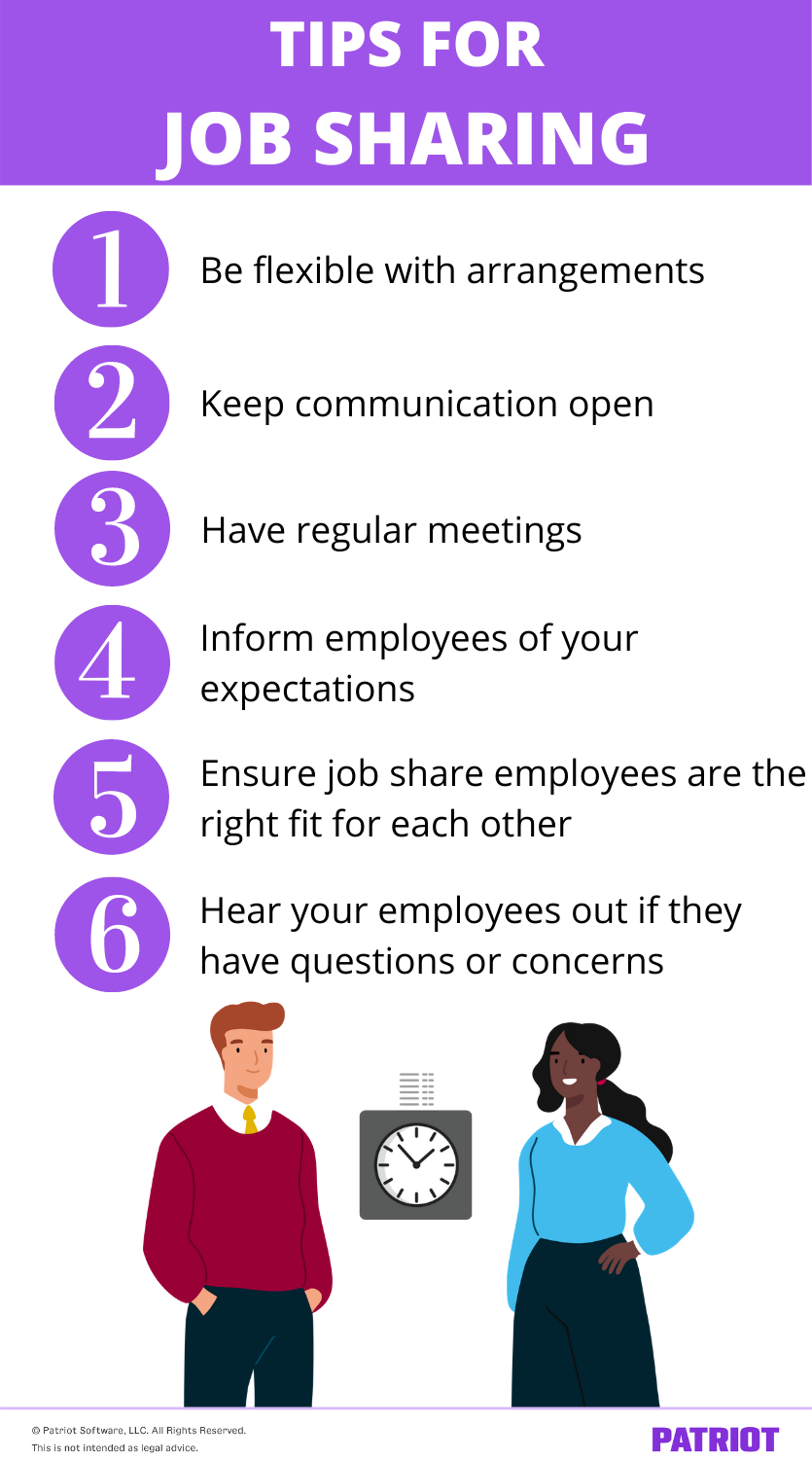Flexible work arrangements are becoming more and more popular in the business world. One type of flexible option for employees is job sharing. So, what is job sharing?
What is job sharing?
Job sharing is when two people work part-time schedules to complete the work one person would do in a full-time position. Basically, with job sharing, two people share the same job and duties.
Hours for job sharing can vary. And, employees who job share may work together part of the week or may never work together. An employer and the job sharing employees must work together to determine how to split up the role.
There are two types of job shares:
- Twins model
- Two employees work together on the same projects and tasks
- Island model
- Two employees work independently and on different tasks
In short, the type of model determines how the employees divvy up the work and share the position.
Although job sharing is not very common (only 2% of employers have a job sharing option), it can be used in many different industries and professions. Job sharing is more common for healthcare workers, such as nurses and doctors.
Some businesses may allow employees to job share if they need to take care of an ill family member or have to stay home with their child. You may also utilize job sharing to help prevent layoffs, receive temporary help, and retain employees during major life events (e.g., working and going to school).
A job sharing program has its advantages, disadvantages, and challenges for employers and employees alike.
Advantages of job sharing
Job sharing can benefit both the employer and employees. Take a look at some benefits of job sharing for both.
Advantages for employers:
- Increased satisfaction with employees’ jobs and work
- Top talent retention
- Improved recruiting
- Additional coverage for certain jobs or shifts
- Increased accountability among job sharing employees
- Reduced absenteeism
- Lower overtime costs
Advantages for employees:
- Better work-life balance and flexibility
- Less stress
- Boosted productivity
- Lighter workload
Disadvantages of job sharing
On the other hand, there are some disadvantages to job sharing that you should be aware of before implementing it at your business. Take a look at some cons of job sharing for employees and employers.
Disadvantages for employers:
- Potential conflict at work between employees
- Increased costs (e.g., benefits)
- Scheduling challenges (e.g., meetings)
- Disruption of workflow
- Possibility of additional training needed
Disadvantages for employees:
- Possible miscommunication
- May not work well with the other employee
- Fewer opportunities for advancement
- Job sharing partner may be less productive
Job sharing: Example
So, now that you’ve learned all about job sharing, let’s see an example in action.
Say your full-time employee, Elizabeth, started to take care of her ill mother. Because of personal responsibilities, she decided she can no longer work her full-time schedule, but still wants to be an employee of the company.
To retain Elizabeth as an employee and accommodate her personal needs, you determine that a job sharing arrangement would be best for her. Instead of working her full-time position, Elizabeth will now work Monday, Tuesday, and part of Wednesday and job share the rest of the days she normally works. Her job sharing partner will cover the remainder of Wednesday as well as all day Thursday and Friday.
Tips for making job sharing successful
Job sharing can be tricky. And, it’s not the right fit for every type of business. If you want to avoid job share problems and create a successful job sharing program, keep these tips in mind:
- Be flexible with arrangements
- Keep communication open
- Have regular meetings to keep everyone on the same page
- Inform employees of your expectations
- Ensure job share employees are the right fit for each other
- Hear your employees out if they have questions or concerns
The most important part of making job sharing successful for your employees and business is communication. Without it, your employees may struggle to work together as one. With it, job share employees can stay on the same page, be efficient, and have greater productivity.

Implementing job sharing at your business
Ready to start a job sharing program at your business? Great! To implement job sharing for your employees, create a job sharing plan.
In your plan, outline a number of things, including:
- Which employees are eligible for job sharing opportunities
- Reasons why employees can opt to job share
- How employees can split hours (e.g., 50/50)
- How employees must submit a job share request
- Manager expectations for job share workers
- Consequences for not following job sharing rules
After you implement your job sharing policy, consider having a company meeting to give employees the opportunity to ask questions. Keep your job sharing policy in your employee handbook for easy access.
Need an easy way to pay your employees? Patriot’s online payroll software makes running payroll a breeze. Plus, we offer free, USA-based customer support. Try it for free today!
This is not intended as legal advice; for more information, please click here.



